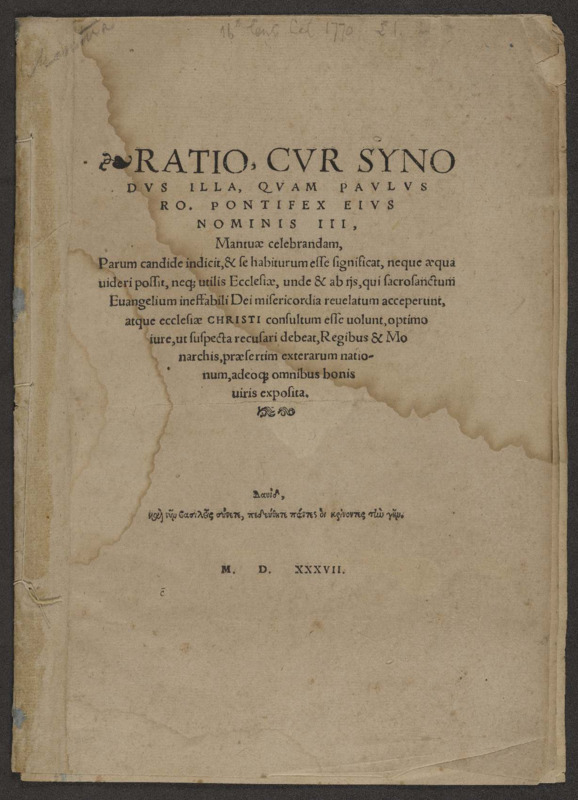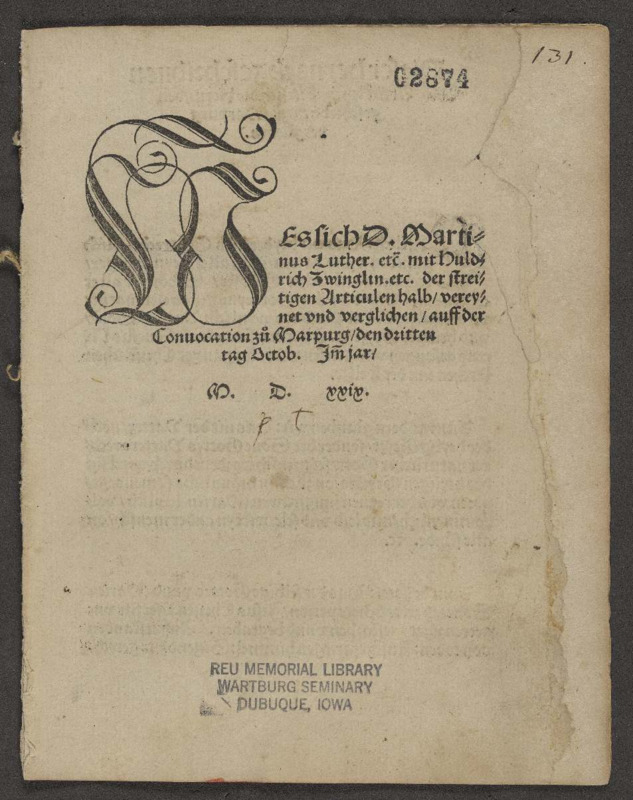Richard C. Kessler Reformation Collection
The Richard C. Kessler Reformation Collection was established in 1987, when Richard and Martha Kessler donated their private collection of Reformation imprints and manuscripts to Emory University. These materials were combined with Reformation holdings at the Pitts Theology Library, and an effort was launched to enlarge and sustain this collection in the years to come. An advisory committee of Lutheran laypersons and clergy and of Candler School of Theology faculty and administrators oversees the nurture of the collection and its programs. The Reformation Notes newsletter provides semiannual updates on the growth of the collection, and the Reformation Day at Emory program of music and lectures each October celebrates the collection and its contributions to music, history, and theology. In the sixteenth century the social and theological movements of central Europe, known collectively as the Reformation, critically shaped religion, law, education and other institutions in the West, and their long shadow has extended even to the present. The purpose of the Kessler Collection is to document these changes by collecting print and manuscript materials down to 1570 by Martin Luther (1483-1546) and those whom he influenced or engaged in debate. In this way historians and theologians will be able to hear the full range of voices that were raised in this dynamic period. The holdings of the collection now exceed 4,000 items, a mark approximated by only two other libraries in North America; no American library approaches the Kessler Collection's 1,000+ publications by Luther himself.
-
![A woodcut border to Luther's Die weyse der Mess, vn[d] geniessung des hochwirdigen Sacrame[n]ts, für die Christliche gemain verteütscht / Do. Mar. Luth. M.D.XXiij. The border consists of four separate woodcuts depicting ornamented columns with bird designs (sides), a plant motif (top), and a pair of fish flanking horns with birds (bottom).](https://s3.us-west-2.amazonaws.com/omekacloud-main/large/P_300000367178_P003/P_300000367178_P003.jpg) Still image
Still imageHistoriated title page border of Die weyse der Mess, vn[d] geniessung des hochwirdigen Sacrame[n]ts, für die Christliche gemain verteütscht
A woodcut border to Luther's Die weyse der Mess, vn[d] geniessung des hochwirdigen Sacrame[n]ts, für die Christliche gemain verteütscht / Do. Mar. Luth. M.D.XXiij. The border consists of four separate woodcuts depicting ornamented columns with bird designs (sides), a plant motif (top), and a pair of fish flanking horns with birds (bottom). -
 Text
TextEinweyhung eines newen Hauses zum Predigampt Göttlichs Worts erbawet, Im Churfůrstlichen Schloss zu Torgaw
Luther, Martin, 1483-1546Summary: Second edition of a sermon preached on October 5, 1544 on Luke 14 (Healing of the man with dropsy on the Sabbath day). The sermon was preached in Torgau at the dedication of a new chapel in the Elector's Castle and the text was edited by Caspar Creutziger. -
 Text
TextEin Schrifft D. Johann Bugenhagen Pomerani, Pastoris der Kirchen zu Witteberg : An andere Pastorn vnnd Predigern, Von der jtzigen Kriegsrüstung
Bugenhagen, Johann, 1485-1558Summary: Open letter by Johann Bugenhagen, pastor in Wittenberg, to the clergy of Saxony concerning the coming Schmalkald War. -
 Text
TextEine kurtze schöne christliche Prediget, vom hochwirdigen Sacrament des Abentmals vnsers Herrn Jhesu Christi : Sampt einer Predigt, Wie ein Christ hie auff Erden seliglich reisen vnd wandeln sol, Vnd was jm jn solcher Reise hindern mag, gestellet auff die Wort S. Paulus, Ephe. v. Seid Gottes nach Folger, als die lieben Kinder. Mit einer Kurtzen Auslegung des ersten Psalmen
Spangenberg, JohannSummary: Two sermons by the Lutheran preacher Johann Spangenberg on the sacrament of the eucharist and on Christian life, based on Ephesians 5, as well as a short exegesis of Psalm 1. -
 Text
TextEine Predigt. Wie ein Christ hie auff Erden, seliglich reisen vnd wandel sol : Vnd was jm in solcher Reise hindern mag. Gestellet auff die Wort S. Paulus, Ephe. 5. Seid Gottes Nach Folger, als die lieben Kinder. Sampt einer kurtzen Auslegung des ersten Psalmen
Spangenberg, JohannSummary: Sermon on Christian life by the Lutheran preacher Johann Spangenberg, based on Ephesians 5:1, followed by an interpretation of Psalm 1. -
 Text
TextEin lüstig gesprech der Teuffel vnd etlicher Kriegsleute : Von der flucht des grossen Scharrhansen H. Heinrichs von Braunschweig
Summary: While Henry, the Younger, Duke of Brunswick-Wolfenbüttel, openly identified with the Roman Catholic Church in its struggle against the Reformation, his religious principles were often dictated by political expediency. He is, in fact, said to have permitted Lutheran influences in a variety of instances in his duchy. Defeated by the Lutheran princes of the Schmalkald League, he was driven from his territories, returning after their defeat at the hands of the Imperial army. This dialogue between the devil and some soldiers satyrizes Henry. -
 Text
TextVonn dem Ampt der Fürsten : vnd welcher Gestalt inen das auss Gottes Befelch aufflegen thüe die Abstellung der Missbräuch in den Kirchen
Melanchthon, Philipp, 1497-1560Summary: Tract on the duties and responsibilties of civic leaders, and on the relationship between church and state, first published in Latin a year earlier. -
 Text
TextDisputaciones circulatim expediendae
Luther, Martin, 1483-1546Summary: This disputation centered around the question of whether the German princes could offer armed resistance to the Emperor, and whether they ought to support him in his war against the Turks. Luther came to believe that any support of the Emperor when he was acting in a religious capacity (in league with the pope) was wrong, because the pope was acting contrary to the Gospel. This is the first (and only) printing of this revised version of these theses. It contains 91 theses, whereas the first version (written before the Emperor and princes had come to terms) contained only 70 theses. -
 Text
TextRatio, cur synodus illa, quam Paulus Ro. Pontifex eius nominis III, Mantuae celebrandam, parum candide indicit, & se habiturum esse significat, neque aequa inderi possit, neq[ue] utilis Ecclesiae, unde & ab ijs, qui sacrosanctum Euangelium ineffabili Dei
Summary: When Pope Paul III called for a reform council at Mantua in 1536, the Protestants were faced with a dilemma. If they attended the council they would be recognizing the Pope's authority in such matters. If they refused, then it might appear that their calls for a general council had been insincere. The sticky task of responding to the pope's call fell upon Melanchthon. This is an edition of his response. -
 Text
TextZwo schöne tröstliche Predigt zu Smalkalden gethon
Luther, Martin, 1483-1546Summary: One sermon expanded by G. Rörer into two, preached February 18, 1537, on text: Matthew IV, 1-11. The subjects are Temptation, and Last Things. -
 Text
TextS.D.n.D. Pauli diuina prouidentia p.p. III : Bullla indictionis sacro sancti generalis concilii
Catholic Church. Pope (1534-1549 : Paul III)Summary: Latin text of the Papal Bull Ad Dominici gregis curam, issued June 4, 1536, for the Council of Mantua which was never held (council eventually took place in Trent). -
 Text
TextBericht Amb[r]osii Blaurer von dem Widerruff, so er bey dem articul des hochwirdigen Sacraments des Leibs vnnd Blůts vnsers Herren Jesu Christi gethon soll haben, : auss wölchem auch Vergleichung streittender Mainungen bey dem heylgen Nachtmal des Herren, leichtlich von den vnangefochtnen from[m]hertzigen Christen vermerckt mag werden
Blarer, Ambrosius, 1492-1564Summary: When Blarer was asked by Duke Ulrich of Württemberg to introduce the Reformation in the duchy, he tried to mediate between Zwingli and the Lutherans in the matter of the eucharist. He came to Stuttgart in 1534 to support a compromise and was criticized for abandoning the position he had held while still in Konstanz. In this tract he defends himself against these criticisms and affirms his support of the Stuttgart Concord. -
 Text
TextD. Erasmi Roterodami De praeparatione ad mortem liber : cum primis pius, nunc primum & conscriptus & editus
Erasmus, Desiderius, -1536Summary: Composed by Erasmus of Rotterdam, at the latest, in 1533, this tract on preparing for death first appeared in printed form in Basel at the beginning of 1534. This printing was followed by the Cologne printing in April. It is dedicated to Thomas Boleyn, Earl of Wiltshire and Ormond (1477-1539), the father of Henry VIII's second wife, Anne Boleyn. -
 Text
TextZwo Predig über der Leiche des Kurfürsten Hertzog Johans zu[o] Sachssen
Luther, Martin, 1483-1546Summary: Two funeral sermons by Martin Luther on the occasion of John the Steadfast, Elector of Saxony, who had founded and headed the Smalcaldic League. John was succeeded by his son Johann Friedrich I. -
 Text
TextD. Erasmi Roterodami Liber de sarcienda ecclesiae concordia deq[ue] : sedandis opinionum dissidijs, cum alijs nonnullis lectu dignis
Erasmus, Desiderius, -1536Summary: A call for concord and harmony in the church by one of the great Humanists of the time. -
 Text
TextEin Sermon vom Creutz vnd leiden : vnd wie man sich darein schicken sol
Luther, Martin, 1483-1546Summary: The first sermon Luther preached in the Coburg Castle on April 16, 1530. The theme is the Cross and Suffering. -
 Text
TextAinn Sermon oder Predigt von der Aufferstehung Christi
Alber, Matthäus, 1495-1570Summary: First and possibly only edition of a sermon by Mathäus Alber on the resurrection of Christ. Alber was an active reformer in Swabia, particularly in Reutlingen and Esslingen. -
 Text
TextPhilipps Melanchthons handtbuchlein wie man die kinder zu der geschrifft vnd lere halten soll. Wittenberg. M.D.XIX
Melanchthon, Philipp, 1497-1560Summary: Melanchthon's "Handtbuchlein" is among the first attempts at a Protestant catechism. It is a collection of selections from scripture passages, prayers, and other text intended as instruction for students in German schools. Noteworthy are the "Seven Wise Saying" derived from Periander by Erasmus. -
 Text
TextDie bekentnus Doctoris Martini Luthers auff den yetzigen Angesteltenn Reychstag zu Augspurg einzuolegen : in Siebenzehen Artickel verfasset
Luther, Martin, 1483-1546Summary: One of at least 11 printings produced in 1530 of the Schwabach Articles, 17 articles of faith composed by Luther 1529 in Schwabach. It became one of the foundational documents for the Augsburg Confession.Bound in modern dark green morocco, bordered, blind- and gilt-tooled, with inside dentelles, gold spine title, and gilt edges. Upper board scratched. -
 Text
TextDas schön Confitemini an der zal der CXVIII Psalm
Luther, Martin, 1483-1546Summary: Text in German includes Luther's German translation of Psalms CXVIII from the Hebrew O.T., and is Luther's expanded version of his earlier Latin work. -
 Text
TextWes sich D. Martinus Luther. etc. mit Huldrich Zwinglin. etc. der streitigen Articulen halb, vereynet vnd verglichen auff der Conuocation zu[o] Marpurg, den dritten Tag Octob. Im Jar, M. D. xxix
Colloquy of Marburg (1529)Summary: The Colloquy of Marburg was a meeting arranged at the initiative of Philip of Hessen in an attempt to forge religious unity in Germany and mediate theological differences between Lutherans and Zwinglians. Besides Luther and Zwingli, the meeting was also attended by Johannes Agricola, Johannes Brenz, Martin Bucer, Caspar Hedio, Justus Jonas, Philipp Melanchthon, Johannes Oecolampadius, and Andreas Osiander.